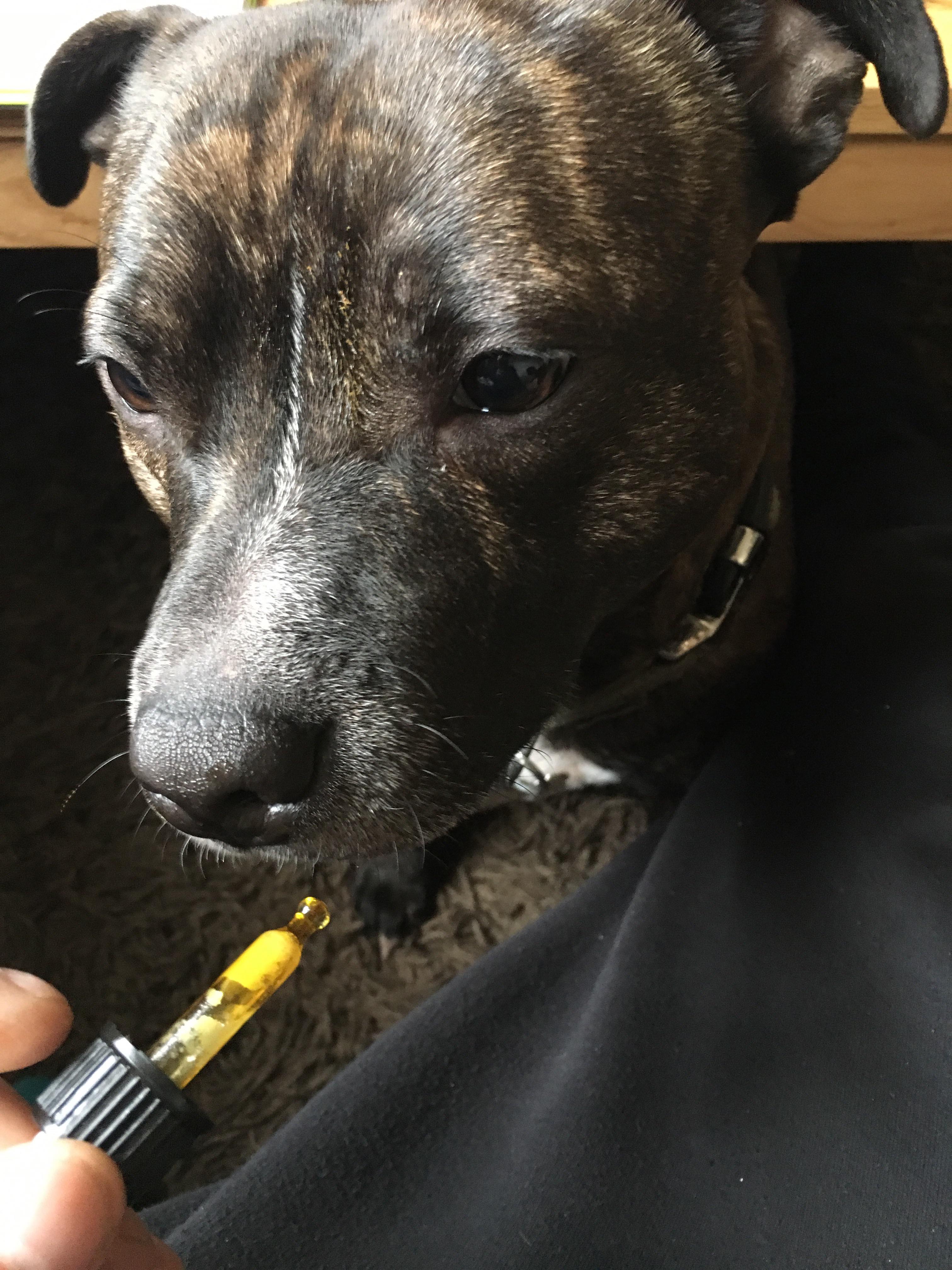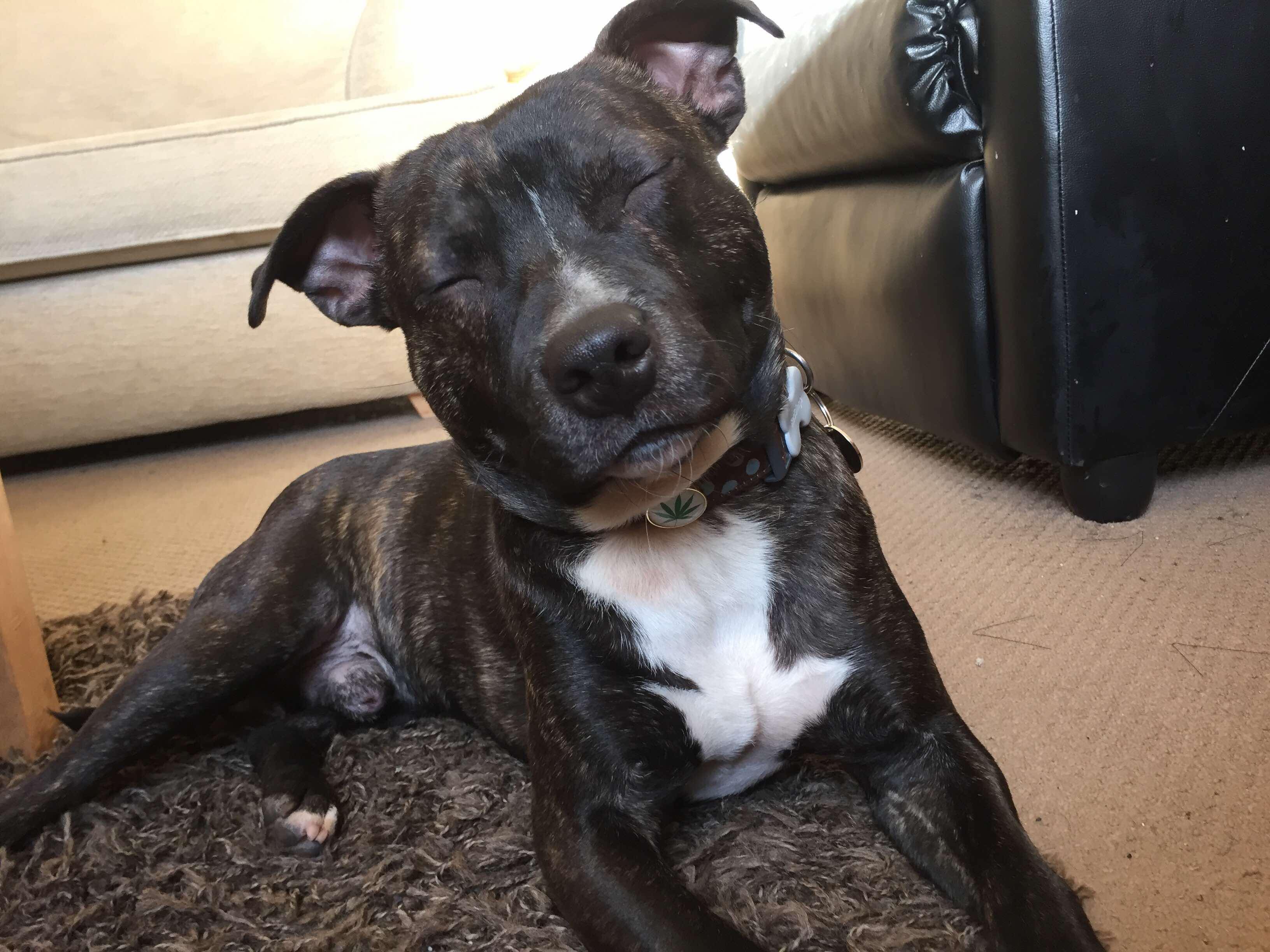British man saved his dog life using CBD oil
- A man from Suffolk has claimed that Cannabidiol (CBD) has saved the life of his epileptic dog
- His dog, Titch, went from having multiple life-threatening seizures a day to just 3 since June 2017
- “CBD has absolutely changed both of our lives, I don’t think he’d be alive today without it”
- Could CBD become a regular medication for British pets?
A British man has told Medical Marijuana UK that a legal cannabis-based food supplement has changed the life of his severely epileptic dog, Titch. Steve Watson, from Suffolk, turned to Cannabidiol (CBD), the non-psychoactive cannabinoid (chemical) found in cannabis and hemp, after Titch’s seizures became so severe that vets wanted to start him on pharmaceutical medications.
Steve told us:
“About 2 years ago my dog Titch started having seizures.
“They started out as little fits or ‘turns,’ gradually getting worse and closer together until his seizures were coming more and more often.
“At that time, somebody tagged me in a Facebook video where a dog was exhibiting signs of a seizure, they administered CBD, and the “fit” seemingly stopped.
“At that same time, I was getting to the point where I’d have had to have taken him to the vets, where he fit the criteria to be medicated daily, which is something I really wanted to avoid, as the medications for epilepsy often get the dog ‘stoned’.”
We have previously reported on numerous human patients who have turned to cannabinoid-medication for epilepsy instead of traditional, and often dangerous, pharmaceutical medications, including the brave young Billy Caldwell from Northern Ireland. “CBD has absolutely changed both of our lives, I don’t think he’d be alive today without it.”
Steve explained why he decided to try CBD rather than pharmaceuticals:
“I had given him diazepam before, and I didn’t like what it did to him, so it was important to me that he never take that first dose of phenobarbital or gabapentin.”
One of the many reasons for the explosion in use of CBD in the UK are the CBD help groups being set up on social media websites, such as Facebook.
These groups help newcomers to the health supplement craze, such as Steve, help understand how the medicinal cannabinoid works, what doses to use, which brands are genuine, etc:
“At that time, I was invited to a CBD group on FaceBook and also received some samples of CBD.
“I had no idea what I was doing, so I just did what I thought was right, and started giving him oil as soon as possible.”
Steve was amazed at just how quickly the hemp-derived medication worked:
“It was only 2 days later that he had his next fit, but instead of having a massive fit followed by a cluster, he had one small seizure, and recovered quicker than he had before.

“Then after I’d been giving it to him for a few weeks, his fits stopped completely, and I’m confident that I’m completely controlling his fits with CBD.
It’s also helped with his appetite and water intake, he even sleeps better.” But how does the CBD spray help treat Titch’s seizures?
Epileptic seizures are caused by irregular electrical discharges, or misfiring, among brain cells. This causes convulsions of the body, loss of consciousness, and sometimes severely altered senses.
Cannabidiol has anticonvulsant properties, which help reduce seizures in mammals.
All mammals have an Endocannabinoid System (ECS), including our beloved canine and feline pets. The ECS allows cannabinoids, such as CBD and THC, to interact with our bodies.
The anticonvulsant properties of CBD work by operating on different targets, which are calcium ion channels, glutamate receptor antagonists, sodium ion channels, and the GATA system and receptor agonists, in the brain.
Anticonvulsants may affect the neurotransmitters responsible for sending messages or attach themselves to the neurons. This is done to alter the activity of the cell by switching how ions flow into and out of the neurons.
Cannabinoid medications, however, are not a “cure-all,” meaning they may work better on different patients (both human and animal) as Steve was quick to stress:
“Recently he [Titch] had to go to the vet to have a growth removed, and while he was there, I thought I’d have him castrated.
“I didn’t even take into consideration that the GA would trigger his epilepsy, so after his surgery, he had 2 days of seizures, it took me back to the powerlessness I felt before CBD, so from that I learned that CBD is brilliant, but it’s not a magic fix.
“Now he has the very occasional fit early in the morning, and when he wakes up he doesn’t remember like he used to.
“He doesn’t cry like he used to.
“CBD has absolutely changed both of our lives, I don’t think he’d be alive today without it.

“He’s been on CBD since June 2017, and since starting him on it, and not including when he had the surgery, he’s had maybe 3 seizures, and all of them were much less intense than before.
I can go out and know that he’s going to be alright and not seizing in his create. So it’s changed his life for the better. And I don’t have to force pills down his throat, and he doesn’t get stoned from pharmaceuticals.
It’s a blessing, I’d recommend it to anyone, it’s worth trying. It might not work, but it certainly won’t do any harm.”
The UK is currently undergoing a “CBD Boom,” with hundreds of different brands making it difficult for customers to find a legitimate brand that works for them.
Steve told he has found success with Simply CBD:
“I started him on Simply CBD “light” oil, which is a low % CBD and great for dogs, as they’ve got smaller brains, they’re more susceptible to it.
“I started on a very low dose, gradually building him up to a 400mg, or 4%, Simply CBD oil which I give to him 5 times a day.
“He hates the taste, he’s not a fan of having it dropped in his mouth, but he does let me give it to him like that, and as I have to be sure he’s had a full dose, I need to make sure it lands directly on his tongue.
“For more difficult dogs, I’d wait until they’re asleep, then lift up their gum and drop it on the flashiest part I could see.”
Epilepsy affects an estimated 0.6-0.7% of all dogs in the UK (around 1 in 130 dogs). Could CBD be the future of their treatment?
Would you be willing to try CBD for your pet? Let us know in the comments.

I have a 7 year old husky. He’s arthritic in his hips. Will definitely be trying CBD oil on him. I already take it myself so let’s see if it will allow him to be more active.
My friend’s 8 year old Lurcher has cancer in his mouth and she has been using some natural treatments which seem to have slowed it’s growth. After reading your information & the results achieved she would really like to try CBD oil asap. Thank you and her email details are below if you can help her please …
Our dog has inflammation of the brain and takes seizures he is on medication from vet but would CBDoil help him he is a lapso Paso
I have a 5 year old unneutered mini Schnauzer who was diagnosed with Atopic Dermatitis although I have seen the vet again I am now told it might be to do with his anal glands and gut. He weighs about 15 lbs and I would like to start him on CBD but am unsure of the dose and how often. I also have a 16 month old male who sufferes with anxiety and is inclined to scream around other dogs, although as a young pup (I bred him) he was fine. I am wondering whether CBD would help him and what dose I should use.
Many thanks for your help.